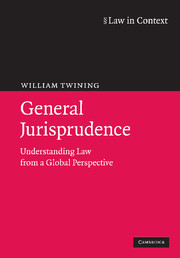14 - Conclusion
Published online by Cambridge University Press: 05 June 2012
Summary
At the risk of some repetition, this chapter draws together the main threads of the argument so far. The later chapters (published at www.) further concretise the general thesis. The purpose of this book is to explore the implications of globalisation for the discipline of law and for jurisprudence as its theoretical, or more abstract, part. The primary objective of the institutionalised discipline of law is understanding law (i.e. the main subject matters of the discipline). The scope and nature of these subject matters has long been contested with differing views falling into two internally varied camps: a narrow view that treats law as doctrine – rules, principles, concepts, and rule systems – and a more expansive view, which extends beyond doctrine to include social practices, institutions, processes, and personnel, as well as rules. This book adopts an expansive conception of our discipline and uses a broad conception of law as a form of institutionalised social practice as its organising concept. However, this in no way suggests that doctrine, concepts, and rules are unimportant. It recognises that law as ideas, which have not necessarily been institutionalised as social practices, is a central aspect of the concept of a legal tradition; that the precept ‘for purposes of understanding law, the study of rules alone is not enough’ applies as much to studies focused on doctrine (one version of ‘law in context’) as to broader studies that extend to actual practices and institutions.
Information
- Type
- Chapter
- Information
- General JurisprudenceUnderstanding Law from a Global Perspective, pp. 443 - 451Publisher: Cambridge University PressPrint publication year: 2009
